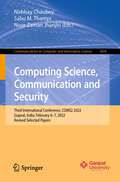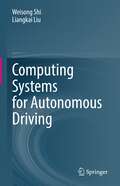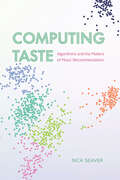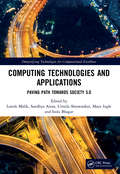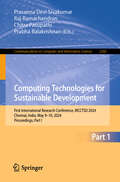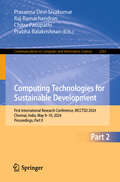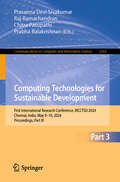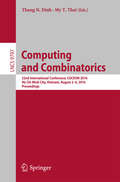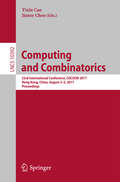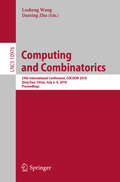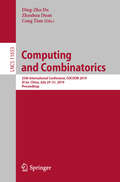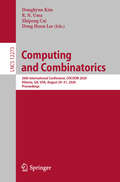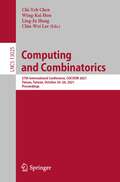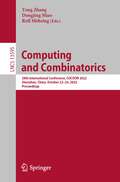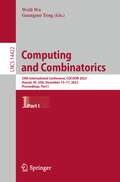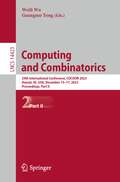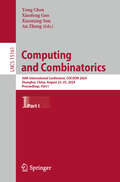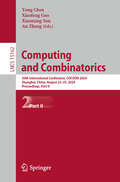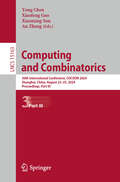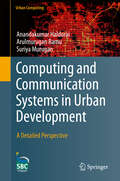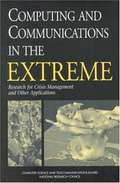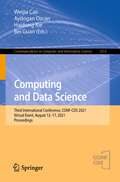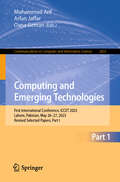- Table View
- List View
Computing Science, Communication and Security: Third International Conference, COMS2 2022, Gujarat, India, February 6–7, 2022, Revised Selected Papers (Communications in Computer and Information Science #1604)
by Sabu M. Thampi Nirbhay Chaubey Noor Zaman JhanjhiThis book constitutes revised selected papers of the Third International Conference on Computing Science, Communication and Security, COMS2 2022, held in Gandhinagar, India, in February 2022. Due to the COVID-19 pandemic the conference was held virtually. The 22 full papers were thoroughly reveiwed and selected from 143 submissions. The papers present ideas, and research results on the aspects of computing science, network communication, and security.
Computing Systems for Autonomous Driving
by Weisong Shi Liangkai LiuThis book on computing systems for autonomous driving takes a comprehensive look at the state-of-the-art computing technologies, including computing frameworks, algorithm deployment optimizations, systems runtime optimizations, dataset and benchmarking, simulators, hardware platforms, and smart infrastructures. The objectives of level 4 and level 5 autonomous driving require colossal improvement in the computing for this cyber-physical system. Beginning with a definition of computing systems for autonomous driving, this book introduces promising research topics and serves as a useful starting point for those interested in starting in the field. In addition to the current landscape, the authors examine the remaining open challenges to achieve L4/L5 autonomous driving. Computing Systems for Autonomous Driving provides a good introduction for researchers and prospective practitioners in the field. The book can also serve as a useful reference for university courses on autonomous vehicle technologies.This book on computing systems for autonomous driving takes a comprehensive look at the state-of-the-art computing technologies, including computing frameworks, algorithm deployment optimizations, systems runtime optimizations, dataset and benchmarking, simulators, hardware platforms, and smart infrastructures. The objectives of level 4 and level 5 autonomous driving require colossal improvement in the computing for this cyber-physical system. Beginning with a definition of computing systems for autonomous driving, this book introduces promising research topics and serves as a useful starting point for those interested in starting in the field. In addition to the current landscape, the authors examine the remaining open challenges to achieve L4/L5 autonomous driving. Computing Systems for Autonomous Driving provides a good introduction for researchers and prospective practitioners in the field. The book can also serve as a useful reference for university courses on autonomous vehicle technologies.
Computing Taste: Algorithms and the Makers of Music Recommendation
by Nick SeaverMeet the people who design the algorithms that capture our musical tastes. The people who make music recommender systems have lofty goals: they want to broaden listeners’ horizons and help obscure musicians find audiences, taking advantage of the enormous catalogs offered by companies like Spotify, Apple Music, and Pandora. But for their critics, recommender systems seem to embody all the potential harms of algorithms: they flatten culture into numbers, they normalize ever-broadening data collection, and they profile their users for commercial ends. Drawing on years of ethnographic fieldwork, anthropologist Nick Seaver describes how the makers of music recommendation navigate these tensions: how product managers understand their relationship with the users they want to help and to capture; how scientists conceive of listening itself as a kind of data processing; and how engineers imagine the geography of the world of music as a space they care for and control. Computing Taste rehumanizes the algorithmic systems that shape our world, drawing attention to the people who build and maintain them. In this vividly theorized book, Seaver brings the thinking of programmers into conversation with the discipline of anthropology, opening up the cultural world of computation in a wide-ranging exploration that travels from cosmology to calculation, myth to machine learning, and captivation to care.
Computing Taste: Algorithms and the Makers of Music Recommendation
by Nick SeaverMeet the people who design the algorithms that capture our musical tastes. The people who make music recommender systems have lofty goals: they want to broaden listeners’ horizons and help obscure musicians find audiences, taking advantage of the enormous catalogs offered by companies like Spotify, Apple Music, and Pandora. But for their critics, recommender systems seem to embody all the potential harms of algorithms: they flatten culture into numbers, they normalize ever-broadening data collection, and they profile their users for commercial ends. Drawing on years of ethnographic fieldwork, anthropologist Nick Seaver describes how the makers of music recommendation navigate these tensions: how product managers understand their relationship with the users they want to help and to capture; how scientists conceive of listening itself as a kind of data processing; and how engineers imagine the geography of the world of music as a space they care for and control. Computing Taste rehumanizes the algorithmic systems that shape our world, drawing attention to the people who build and maintain them. In this vividly theorized book, Seaver brings the thinking of programmers into conversation with the discipline of anthropology, opening up the cultural world of computation in a wide-ranging exploration that travels from cosmology to calculation, myth to machine learning, and captivation to care.
Computing Taste: Algorithms and the Makers of Music Recommendation
by Nick SeaverMeet the people who design the algorithms that capture our musical tastes. The people who make music recommender systems have lofty goals: they want to broaden listeners’ horizons and help obscure musicians find audiences, taking advantage of the enormous catalogs offered by companies like Spotify, Apple Music, and Pandora. But for their critics, recommender systems seem to embody all the potential harms of algorithms: they flatten culture into numbers, they normalize ever-broadening data collection, and they profile their users for commercial ends. Drawing on years of ethnographic fieldwork, anthropologist Nick Seaver describes how the makers of music recommendation navigate these tensions: how product managers understand their relationship with the users they want to help and to capture; how scientists conceive of listening itself as a kind of data processing; and how engineers imagine the geography of the world of music as a space they care for and control. Computing Taste rehumanizes the algorithmic systems that shape our world, drawing attention to the people who build and maintain them. In this vividly theorized book, Seaver brings the thinking of programmers into conversation with the discipline of anthropology, opening up the cultural world of computation in a wide-ranging exploration that travels from cosmology to calculation, myth to machine learning, and captivation to care.
Computing Technologies and Applications: Paving Path Towards Society 5.0 (Demystifying Technologies for Computational Excellence)
by Latesh MalikMaking use of digital technology for social care is a major responsibility of the computing domain. Social care services require attention for ease in social systems, e-farming, and automation, etc. Thus, the book focuses on suggesting software solutions for supporting social issues, such as health care, learning about and monitoring for disabilities, and providing technical solutions for better living. Technology is enabling people to have access to advances so that they can have better health. To undergo the digital transformation, the current processes need to be completely re-engineered to make use of technologies like the Internet of Things (IoT), big data analytics, artificial intelligence, and others. Furthermore, it is also important to consider digital initiatives in tandem with their cloud strategy instead of treating them in isolation. At present, the world is going through another, possibly even stronger revolution: the use of recent computing models to perform complex cognitive tasks to solve social problems in ways that were previously either highly complicated or extremely resource intensive. This book not only focuses the computing technologies, basic theories, challenges, and implementation but also covers case studies. It focuses on core theories, architectures, and technologies necessary to develop and understand the computing models and their applications. The book also has a high potential to be used as a recommended textbook for research scholars and post-graduate programs. The book deals with a problem-solving approach using recent tools and technology for problems in health care, social care, etc. Interdisciplinary studies are emerging as both necessary and practical in universities. This book helps to improve computational thinking to "understand and change the world’. It will be a link between computing and a variety of other fields. Case studies on social aspects of modern societies and smart cities add to the contents of the book to enhance book adoption potential. This book will be useful to undergraduates, postgraduates, researchers, and industry professionals. Every chapter covers one possible solution in detail, along with results.
Computing Technologies for Sustainable Development: First International Research Conference, IRCCTSD 2024, Chennai, India, May 9–10, 2024, Proceedings, Part I (Communications in Computer and Information Science #2360)
by Prasanna Devi Sivakumar Raj Ramachandran Chitra Pasupathi Prabha BalakrishnanThis book constitutes the refereed proceedings of the First International Research Conference on Computing Technologies for Sustainable Development, IRCCTSD 2024, held in Chennai, India, during May 9–10, 2024. The 65 full papers and 14 short papers presented here were carefully selected and reviewed from 264 submissions. These papers have been organized in the following topical sections: Part I: innovations in precision agriculture techniques and strategies for enhancing agriculture production; classification and prediction analysis in healthcare; animal welfare; and innovations in diagnostics. Part II: video and image processing for security analysis; innovations for smart cities; sustainable practices in e-commerce: challenges and trends. Part III: environmental analysis and protection; inclusive communication techniques; AI for text, audio, image and video processing; and application of AI for education.
Computing Technologies for Sustainable Development: First International Research Conference, IRCCTSD 2024, Chennai, India, May 9–10, 2024, Proceedings, Part II (Communications in Computer and Information Science #2361)
by Prasanna Devi Sivakumar Raj Ramachandran Chitra Pasupathi Prabha BalakrishnanThis book constitutes the refereed proceedings of the First International Research Conference on Computing Technologies for Sustainable Development, IRCCTSD 2024, held in Chennai, India, during May 9–10, 2024. The 65 full papers and 14 short papers presented here were carefully selected and reviewed from 264 submissions. These papers have been organized in the following topical sections: Part I : innovations in precision agriculture techniques and strategies for enhancing agriculture production; classification and prediction analysis in healthcare; animal welfare; and innovations in diagnostics. Part II : video and image processing for security analysis; innovations for smart cities; sustainable practices in e-commerce: challenges and trends. Part III : environmental analysis and protection; inclusive communication techniques; AI for text, audio, image and video processing; and application of AI for education.
Computing Technologies for Sustainable Development: First International Research Conference, IRCCTSD 2024, Chennai, India, May 9–10, 2024, Proceedings, Part III (Communications in Computer and Information Science #2362)
by Prasanna Devi Sivakumar Raj Ramachandran Chitra Pasupathi Prabha BalakrishnanThis book constitutes the refereed proceedings of the First International Research Conference on Computing Technologies for Sustainable Development, IRCCTSD 2024, held in Chennai, India, during May 9–10, 2024. The 65 full papers and 14 short papers presented here were carefully selected and reviewed from 264 submissions. These papers have been organized in the following topical sections: Part I: innovations in precision agriculture techniques and strategies for enhancing agriculture production; classification and prediction analysis in healthcare; animal welfare; and innovations in diagnostics. Part II: video and image processing for security analysis; innovations for smart cities; sustainable practices in e-commerce: challenges and trends. Part III: environmental analysis and protection; inclusive communication techniques; AI for text, audio, image and video processing; and application of AI for education.
Computing and Combinatorics: 22nd International Conference, COCOON 2016, Ho Chi Minh City, Vietnam, August 2-4, 2016, Proceedings (Lecture Notes in Computer Science #9797)
by My T. Thai Thang N. DinhConstitutes the proceedings of the 16th Annual International Conference on Computing and Combinatorics, held in Nha Trang, Vietnam, in July 2010.
Computing and Combinatorics: 23rd International Conference, COCOON 2017, Hong Kong, China, August 3-5, 2017, Proceedings (Lecture Notes in Computer Science #10392)
by Yixin Cao and Jianer ChenThis book constitutes the refereed proceedings of the 23rd International Conference on Computing and Combinatorics, COCOON 2017, held in Hiong Kong, China, in August 2017. The 56 full papers papers presented in this book were carefully reviewed and selected from 119 submissions. The papers cover various topics, including algorithms and data structures, complexity theory and computability, algorithmic game theory, computational learning theory, cryptography, computationalbiology, computational geometry and number theory, graph theory, and parallel and distributed computing.
Computing and Combinatorics: 24th International Conference, COCOON 2018, Qing Dao, China, July 2-4, 2018, Proceedings (Lecture Notes in Computer Science #10976)
by Lusheng Wang Daming ZhuThis book constitutes the proceedings of the 24th International Conference on Computing and Combinatorics, COCOON 2018, held in Qing Dao, China, in July 2018. The 62 papers presented in this volume were carefully reviewed and selected from 120 submissions. They deal with the areas of algorithms, theory of computation, computational complexity, and combinatorics related to computing.
Computing and Combinatorics: 25th International Conference, COCOON 2019, Xi'an, China, July 29–31, 2019, Proceedings (Lecture Notes in Computer Science #11653)
by Ding-Zhu Du Zhenhua Duan Cong TianThis book constitutes the proceedings of the 25th International Conference on Computing and Combinatorics, COCOON 2019, held in Xi’an, China, in July 2019. The 55 papers presented in this volume were carefully reviewed and selected from 124 submissions. The papers cover various topics, including algorithm design, approximation algorithm, graph theory, complexity theory, problem solving, optimization, computational biology, computational learning, communication network, logic, and game theory.
Computing and Combinatorics: 26th International Conference, COCOON 2020, Atlanta, GA, USA, August 29–31, 2020, Proceedings (Lecture Notes in Computer Science #12273)
by Donghyun Kim Zhipeng Cai R. N. Uma Dong Hoon LeeThis book constitutes the proceedings of the 26th International Conference on Computing and Combinatorics, COCOON 2020, held in Atlanta, GA, USA, in August 2020. Due to the COVID-19 pandemic COCOON 2020 was organized as a fully online conference. The 54 papers presented in this volume were carefully reviewed and selected from 126 submissions. The papers cover various topics, including algorithm design, approximation algorithm, graph theory, complexity theory, problem solving, optimization, computational biology, computational learning, communication network, logic, and game theory.
Computing and Combinatorics: 27th International Conference, COCOON 2021, Tainan, Taiwan, October 24–26, 2021, Proceedings (Lecture Notes in Computer Science #13025)
by Chi-Yeh Chen Wing-Kai Hon Ling-Ju Hung Chia-Wei LeeThis book constitutes the proceedings of the 27th International Conference on Computing and Combinatorics, COCOON 2021, held in Tainan, Taiwan, in October 2021. Due to the COVID-19 pandemic, COCOON 2021 was organized as a hybrid conference. The 56 papers presented in this volume were carefully reviewed and selected from 131 submissions. The papers are divided into the following topical sub-headings: algorithms, approximation algorithms, automata, computational geometry, fault tolerant computing and fault diagnosis, graph algorithms, graph theory and applications, network and algorithms, online algorithm and stream algorithms, parameterized complexity and algorithms, and recreational games.
Computing and Combinatorics: 28th International Conference, COCOON 2022, Shenzhen, China, October 22–24, 2022, Proceedings (Lecture Notes in Computer Science #13595)
by Yong Zhang Rolf Möhring Dongjing MiaoThis book constitutes the proceedings of the 28th International Conference on Computing and Combinatorics, COCOON 2022, held in Shenzhen, China, in October 2022.The 39 full papers together with 12 short papers presented in this volume were carefully reviewed and selected from 101 submissions. The papers focus on subjects such as Algorithmica, Theoretical Computer Science, Journal of Combinatorial Optimization and others.
Computing and Combinatorics: 29th International Conference, COCOON 2023, Hawaii, HI, USA, December 15–17, 2023, Proceedings, Part I (Lecture Notes in Computer Science #14422)
by Weili Wu Guangmo TongThis two volume set LNCS 14422-14423 constitutes the refereed proceedings of the 29th International Conference, COCOON 2023, held in Hawaii, HI, USA, during December 2023. The 60 full papers were carefully reviewed and selected from 146 submissions. They are organized in the following topical sections:Part I : Combinatorics and Algorithms; Algorithmic Solution in Applications; and Algorithm in Networks.Part II: Complexity and Approximation; Graph Algorithms; and Applied Algorithms.
Computing and Combinatorics: 29th International Conference, COCOON 2023, Hawaii, HI, USA, December 15–17, 2023, Proceedings, Part II (Lecture Notes in Computer Science #14423)
by Weili Wu Guangmo TongThis two volume set volume LNCS 14422-14423 constitutes the refereed proceedings of the 29th International Conference, COCOON 2023, held in Hawaii, HI, USA, during December 2023. The 60 full papers were carefully reviewed and selected from 146 submissions. They are organized in the following topical sections:Part I : Combinatorics and Algorithms; Algorithmic Solution in Applications; and Algorithm in Networks.Part II: Complexity and Approximation; Graph Algorithms; and Applied Algorithms.
Computing and Combinatorics: 30th International Conference, COCOON 2024, Shanghai, China, August 23–25, 2024, Proceedings, Part I (Lecture Notes in Computer Science #15161)
by Yong Chen Xiaofeng Gao Xiaoming Sun An ZhangThis three-volume set LNCS 15161, 15162 and 15163 constitutes the refereed proceedings of the 30th International Conference, COCOON 2024, held in Shanghai, China, during August 23–25, 2024. The 90 full papers and 6 short papers were carefully reviewed and selected from 277 submissions. COCOON 2024 provided an excellent venue for researchers working in the area of algorithms, theory of computation, computational complexity, and combinatorics related to computing.
Computing and Combinatorics: 30th International Conference, COCOON 2024, Shanghai, China, August 23–25, 2024, Proceedings, Part II (Lecture Notes in Computer Science #15162)
by Yong Chen Xiaofeng Gao Xiaoming Sun An ZhangThis three-volume set LNCS 15161, 15162 and 15163 constitutes the refereed proceedings of the 30th International Conference, COCOON 2024, held in Shanghai, China, during August 23–25, 2024. The 90 full papers and 6 short papers were carefully reviewed and selected from 277 submissions. COCOON 2024 provided an excellent venue for researchers working in the area of algorithms, theory of computation, computational complexity, and combinatorics related to computing.
Computing and Combinatorics: 30th International Conference, COCOON 2024, Shanghai, China, August 23–25, 2024, Proceedings, Part III (Lecture Notes in Computer Science #15163)
by Yong Chen Xiaofeng Gao Xiaoming Sun An ZhangThis three-volume set LNCS 15161, 15162 and 15163 constitutes the refereed proceedings of the 30th International Conference, COCOON 2024, held in Shanghai, China, during August 23–25, 2024. The 90 full papers and 6 short papers were carefully reviewed and selected from 277 submissions. COCOON 2024 provided an excellent venue for researchers working in the area of algorithms, theory of computation, computational complexity, and combinatorics related to computing.
Computing and Communication Systems in Urban Development: A Detailed Perspective (Urban Computing)
by Anandakumar Haldorai Arulmurugan Ramu Suriya MuruganThis book presents the most recent challenges and developments in sustainable computing systems with the objective of promoting awareness and best practices for the real world. It aims to present new directions for further research and technology improvements in this important area.
Computing and Communications in the Extreme: Research for Crisis Management and Other Applications
by Communications Steering Committee Workshop Series on High Performance ComputingThis book synthesizes the findings of three workshops on research issues in high-performance computing and communications (HPCC). It focuses on the role that computing and communications can play in supporting federal, state, and local emergency management officials who deal with natural and man-made hazards (e.g., toxic spills, terrorist bombings). The volume also identifies specific research challenges for HPCC in meeting unmet technology needs in crisis management and other nationally important application areas, such as manufacturing, health care, digital libraries, and electronic commerce and banking.
Computing and Data Science: Third International Conference, CONF-CDS 2021, Virtual Event, August 12-17, 2021, Proceedings (Communications in Computer and Information Science #1513)
by Weijia Cao Aydogan Ozcan Haidong Xie Bei GuanThis volume constitutes selected papers presented at the Third International Conference on Computing and Data Science, CONF-CDS 2021, held online in August 2021. The 22 full papers 9 short papers presented in this volume were thoroughly reviewed and selected from the 85 qualified submissions. They are organized in topical sections on advances in deep learning; algorithms in machine learning and statistics; advances in natural language processing.
Computing and Emerging Technologies: First International Conference, ICCET 2023, Lahore, Pakistan, May 26-27, 2023, Revised Selected Papers, Part I (Communications in Computer and Information Science #2055)
by Oana Geman Muhammad Arif Arfan JaffarThe two-volume set CCIS 2055-2056 constitutes the refereed proceedings of the First International Conference on Computing and Emerging Technologies, ICCET 2023, held in Lahore, Pakistan, during May 26-27, 2023. The 50 full papers and 15 short papers included in this book were carefully reviewed and selected from 250 submissions. The papers focused on topics such as blockchain, data science, machine learning, artificial intelligence, and and offered in-depth analyses and practical implementations.
